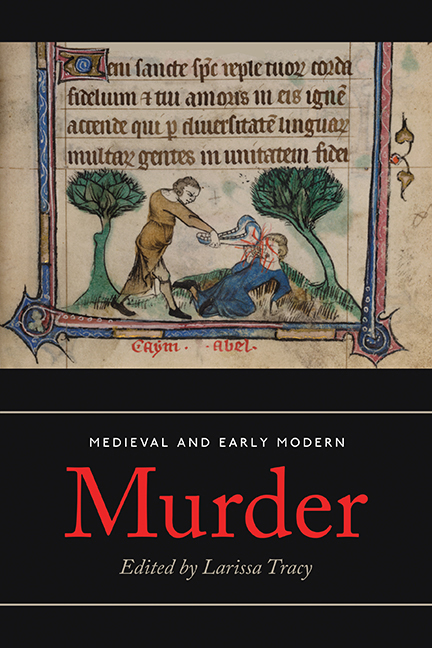Book contents
- Frontmatter
- Contents
- List of Illustrations and Tables
- Acknowledgements
- Contributors
- List of Abbreviations
- Introduction: Murder Most Foul
- I Murder on Trial: Justice, Law and Society
- 1 Secret Killing and Murder by Magic in the Law of Adomnán
- 2 Discursive Murders: The St Brice's Day Massacre, Beowulf and Morðor
- 3 Mourning Murderers in Medieval Jewish Law
- 4 Treacherous Murder: Language and Meaning in French Murder Trials
- 5 ‘Mordre wol out’: Murder and Justice in Chaucer
- II The Public Hermeneutics of Murder: Interpretation and Context
- III Murder in the Community: Gender, Youth And Family
- Conclusion
- Select Bibliography
- Index
1 - Secret Killing and Murder by Magic in the Law of Adomnán
from I - Murder on Trial: Justice, Law and Society
Published online by Cambridge University Press: 05 July 2018
- Frontmatter
- Contents
- List of Illustrations and Tables
- Acknowledgements
- Contributors
- List of Abbreviations
- Introduction: Murder Most Foul
- I Murder on Trial: Justice, Law and Society
- 1 Secret Killing and Murder by Magic in the Law of Adomnán
- 2 Discursive Murders: The St Brice's Day Massacre, Beowulf and Morðor
- 3 Mourning Murderers in Medieval Jewish Law
- 4 Treacherous Murder: Language and Meaning in French Murder Trials
- 5 ‘Mordre wol out’: Murder and Justice in Chaucer
- II The Public Hermeneutics of Murder: Interpretation and Context
- III Murder in the Community: Gender, Youth And Family
- Conclusion
- Select Bibliography
- Index
Summary
OLD IRISH LEGAL TEXTS, dating from the seventh and eighth centuries, recognise four types of killing: kinslaying, illegal homicide, legal killing and secret murder. The term for secret killing, duinetháide, is comprised of duine [person] and táide [theft], which implies kidnapping, with or without a connection to murder; however, legal commentary classifies a murder as duinetháide if the victim's body is hidden or left in the open and the killer does not acknowledge the crime. It is an offence that involves not only homicide (one person killing another) but also secrecy and intent. Duinetháide is directly associated with killing by means of magic in Cáin Adamnáin [Law of Adomnán], an early medieval Irish list of ecclesiastical regulations. Section 46 of Cáin Adamnáin requires a person who kills another by the use of a charm to pay the penalty of secret murder: ‘Mát epthai día n-apallar dabera nech do alailiu, féich dunetáiti ind’ [If it be charms from which death ensues that any one give to another, the fines of murder followed by concealment of the corpse (are to be paid) for it]. Early Irish legal and ecclesiastical penalties for magic and murder suggest that the direct association between duinetháide and supernaturally-induced homicide is unique to Cáin Adamnáin. The majority of penalties associated with supernatural practices in these sources relate to drawing the affections of another to oneself and the purposeful or unintentional obstruction of procreation, indicating insecurity over the potentially harmful, and even lethal, consequences of love magic. Further analysis of the early Irish legal penalties required for both secret murder and magical practices reveals that with the exception of using supernatural methods to hinder reproduction, and therefore inhibit the potential of life, there is no explicit punishment for taking the life of another human by magic in early Irish secular law. Indeed, extant early Irish law appears less troubled about murder by magic than certain other medieval legal cultures. Rather, the lethal effects of magic appear as a particular anxiety of the Church in the early Irish penitentials.
Cáin Adamnáin straddles the ecclesiastical concerns of the penitentials and the fiscal reparation for crimes required of secular law. The severe penalty for murder by magic in Cáin Adamnáin demonstrates the intention of the author(s) to align Irish law with contemporary ecclesiastical attitudes towards the use of illicit supernatural practices.
- Type
- Chapter
- Information
- Medieval and Early Modern MurderLegal, Literary and Historical Contexts, pp. 19 - 46Publisher: Boydell & BrewerPrint publication year: 2018

